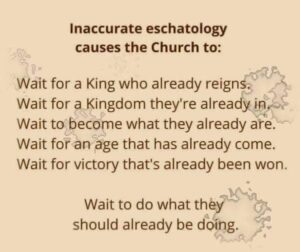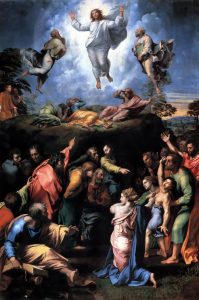 On April 12, a little more than seven months ago, I was privileged to officiate and preach at a service of Choral Evensong at Trinity Episcopal Cathedral in Cleveland. Following the service, on our way home to Medina, my wife Evelyn and I stopped at a Lebanese restaurant in Middleburg Heights for a late dinner in celebration of our 43rd wedding anniversary, which that day was. After a lovely meal of hummus, baba ganoush, spicy beef kafta, and chicken shwarma, we went home to bed. A few hours later, around 2 a.m., I woke up with a horrendous case of heartburn. I took some antacid and went back to sleep sitting up in my favorite armchair. At 7 a.m. the next morning, I woke up knowing that I hadn’t had indigestion after all; I was having a heart attack.
On April 12, a little more than seven months ago, I was privileged to officiate and preach at a service of Choral Evensong at Trinity Episcopal Cathedral in Cleveland. Following the service, on our way home to Medina, my wife Evelyn and I stopped at a Lebanese restaurant in Middleburg Heights for a late dinner in celebration of our 43rd wedding anniversary, which that day was. After a lovely meal of hummus, baba ganoush, spicy beef kafta, and chicken shwarma, we went home to bed. A few hours later, around 2 a.m., I woke up with a horrendous case of heartburn. I took some antacid and went back to sleep sitting up in my favorite armchair. At 7 a.m. the next morning, I woke up knowing that I hadn’t had indigestion after all; I was having a heart attack.
Tag: Common Prayer (Page 2 of 5)
 Today, in the normal course of the Lectionary, would have been the 10th Sunday after Pentecost on which, this year, we would have read the lessons known as “Proper 13” in which the gospel lesson is Matthew’s story of the feeding of the 5,000. However, since this is August 6, we don’t follow the normal course. We step away from the Lectionary to celebrate one of the feasts which, in the language of the Prayer Book, “take precedence of a Sunday,”[1] the Feast of the Transfiguration.
Today, in the normal course of the Lectionary, would have been the 10th Sunday after Pentecost on which, this year, we would have read the lessons known as “Proper 13” in which the gospel lesson is Matthew’s story of the feeding of the 5,000. However, since this is August 6, we don’t follow the normal course. We step away from the Lectionary to celebrate one of the feasts which, in the language of the Prayer Book, “take precedence of a Sunday,”[1] the Feast of the Transfiguration.
The church’s understanding of the meaning of the event described by Luke in today’s gospel lesson is summarized in today’s opening collect: “[O]n the holy mount [God] revealed to chosen witnesses [God’s] well-beloved Son, wonderfully transfigured, in raiment white and glistening.” The collect expresses the church’s hope that Christians “may by faith behold the King in his beauty.”[2] The Collect for the Last Sunday after Epiphany, on which we also read about this event, similarly summarizes the event as the revelation of the Son’s “glory upon the holy mountain,” and expresses the hope that the faithful may be “changed into his likeness from glory to glory.”[3]
In other words, the Transfiguration is all about Jesus, but, while that’s true, nothing about Jesus is ever all about Jesus! It’s about Jesus to whose pattern his followers are to be conformed,[4] so it is about us, as well. And, as any story is about not only its protagonist but also about the “bit players” who surround him, it is about James and John and Peter, who represent us.
 When I was 19 years old, my parish priest, Fr. John Donaldson, died of cancer. I was privileged to be the acolyte and crucifer at his requiem and burial. It was a very formal, high-church affair. In all honesty, I remember very little of Fr. John’s funeral. I don’t remember Bishop Bloy’s homily at all, but I do remember the committal at the graveside. You see, it was my first experience of a burial using the liturgy of the Episcopal Church.
When I was 19 years old, my parish priest, Fr. John Donaldson, died of cancer. I was privileged to be the acolyte and crucifer at his requiem and burial. It was a very formal, high-church affair. In all honesty, I remember very little of Fr. John’s funeral. I don’t remember Bishop Bloy’s homily at all, but I do remember the committal at the graveside. You see, it was my first experience of a burial using the liturgy of the Episcopal Church.
I had been to plenty of funerals by then: my father died when I was five, my grandfather when I was eight, my paternal uncle when I was twelve. But I had been an Episcopalian for only five years when Fr. John died and until then I’d never been to a Prayer Book funeral and I’d never heard the words spoken as dirt is tossed onto the coffin:
Unto Almighty God we commend the soul of our brother departed, and we commit his body to the ground; earth to earth, ashes to ashes, dust to dust; in sure and certain hope of the Resurrection unto eternal life, through our Lord Jesus Christ….[1]
Those words, “in sure and certain hope,” really hit me and have stuck with me through the years. They have been used in Anglican burials since Archbishop Cranmer first penned them for the original Prayer Book in 1549. We still use them in the Prayer Book of 1979. They are fundamental to the Anglican expression of the Christian faith.
 Do any of you know the story of Tubby the Cocker Spaniel? Well . . . remember Tubby’s name. We’ll come back to him, but first let’s put today’s gospel lesson in perspective.
Do any of you know the story of Tubby the Cocker Spaniel? Well . . . remember Tubby’s name. We’ll come back to him, but first let’s put today’s gospel lesson in perspective.
This lesson picks up where last week’s lesson ended. You’ll recall that Jesus is sending the twelve out to do missionary work. “Go,” he tells them “to the lost sheep of the house of Israel . . . proclaim the good news . . . cure the sick, raise the dead, cleanse the lepers, cast out demons.”[1] In last week’s lesson, he warned them that this was not going to be easy, that they would face opposition. In this week’s reading, he continues in that vein and ups the ante, increases the volume: it won’t just be difficult, he says, it’s possibly going to be deadly!
There won’t just be arguments at the Thanksgiving table; there will be fights! Your father or your mother, your sister or your brother . . . they won’t just disagree with you; they will be your enemies; they will try to kill you. “Do not think that I have come to bring peace to the earth; I have not come to bring peace, but a sword.”[2]
 “As Jesus was walking along, he saw a man called Matthew sitting at the tax booth; and he said to him, ‘Follow me.’ And he got up and followed him.”[1] Something similar happens in the Genesis reading from the Hebrew scriptures appointed for today: “The Lord said to Abram, ‘Go from your country and your kindred and your father’s house to the land that I will show you.’ * * * So Abram went, as the Lord had told him….”[2]
“As Jesus was walking along, he saw a man called Matthew sitting at the tax booth; and he said to him, ‘Follow me.’ And he got up and followed him.”[1] Something similar happens in the Genesis reading from the Hebrew scriptures appointed for today: “The Lord said to Abram, ‘Go from your country and your kindred and your father’s house to the land that I will show you.’ * * * So Abram went, as the Lord had told him….”[2]
Abram’s immediate response to God’s call is the subject of Paul’s comments in the Epistle reading from the Letter to the Romans. Abram believed God, believed in God, and acted on that belief, and that combination of belief and action is what Paul refers to as faith and that “faith ‘was reckoned to him as righteousness.’”[3]
 “Put things in order, … agree with one another, live in peace.”[1] That’s Paul’s advice to the Corinthians and to us this morning. It’s a goal to which we often pledge ourselves. Sometimes, though, the world makes it hard to get there.
“Put things in order, … agree with one another, live in peace.”[1] That’s Paul’s advice to the Corinthians and to us this morning. It’s a goal to which we often pledge ourselves. Sometimes, though, the world makes it hard to get there.
In January of 2013, a 16-year-old girl in Detroit, Michigan, was minding her own business in a public playground when she became the innocent victim of a drive-by shooting. Two years later, on June 3, 2015, on what would have been her 18th birthday, her friends decided to honor her memory by dressing in her favorite color, orange, which just happens to be the color hunters wear for safety. The next year, they decided to do it again and create a campaign for gun violence awareness. Thus was born Wear Orange Day which has since become Wear Orange Weekend.[2] Also in 2016, some of us Episcopal clergy here in Ohio heard of their effort and decided to join it by making and wearing orange stoles on the first Sunday of June.[3]

“Name this child.” That’s what I say to parents of infant baptismal candidates as I take their children from them. The words are not actually written in the baptismal service of The Book of Common Prayer as they are in some other traditions’ liturgies, but there is a rubric that says, “Each candidate is presented by name to the Celebrant . . . .”[1] so asking for the child’s name is a practical way of seeing that done. It’s practical, but it’s also a theological statement.
There is a common religious belief found in nearly all cultures that knowing the name of a thing or a person gives one power over that thing or person. One finds this belief among African and North American indigenous tribes, as well as in ancient Egyptian, Vedic, and Hindu traditions; it is also present in all three of the Abrahamic religions, Judaism, Christianity, and Islam.
The naming we do at baptism echoes the naming that takes place in Judaism when a male infant is circumcised on the eighth day after his birth. In that service, called the brit milah or bris, the officiating mohel prays, “Our God and God of our fathers, preserve this child for his father and mother, and his name in Israel shall be called ________”[2] and the prayer continues that, by his naming, the infant will be enrolled in the covenant of God with Israel. A similar thing is done when a girl is named in the ceremony called zeved habat or simchat bat, the “gift (or celebration) of the daughter” on the first sabbath following her birth.[3] With the name given at baptism, the church says to its newest member, “This is who you are: washed in the waters of baptism, sealed by the Holy Spirit, and marked as Christ’s own forever,”[4] a brother or sister in the church, a fellow member of the Body of Christ, an adopted child of God the Father.
 There is an old tradition in the church: on Trinity Sunday, rectors do their best to get someone else to preach. If they have a curate or associate priest, he or she gets the pulpit on that day. If not, they try to invite some old retired priest to fill in (as Rachel has done today). No one really wants to preach on Trinity Sunday, the only day of the Christian year given to the celebration or commemoration of a theological doctrine, mostly because theology is dull, dry, and boring to most people and partly because this particular theological doctrine is one most of us get wrong no matter how much we try to do otherwise.
There is an old tradition in the church: on Trinity Sunday, rectors do their best to get someone else to preach. If they have a curate or associate priest, he or she gets the pulpit on that day. If not, they try to invite some old retired priest to fill in (as Rachel has done today). No one really wants to preach on Trinity Sunday, the only day of the Christian year given to the celebration or commemoration of a theological doctrine, mostly because theology is dull, dry, and boring to most people and partly because this particular theological doctrine is one most of us get wrong no matter how much we try to do otherwise.
We try in all sorts of ways to explain the Trinity, through diagrams, through analogies, through some really bad and usually silly similes and metaphors. Most such explanations are less than convincing, and virtually all are theologically problematic. As Brian McLaren has observed:
Seemingly orthodox Christians expose themselves—often to their own surprise—as closet adoptionists or Arians, unconscious Nestorians or Apollinarians, or implicit monophysitists or monothelitists.[1]
So I’m going to leave Christian theology behind for a moment and ask you a question from another religious tradition: “What is the sound of one hand clapping?”
 A book entitled Stories for the Heart was published a few years ago by inspirational speaker Alice Gray. It is a compilation of what Gray calls “stories to encourage your soul;” one of them is the following story, whose original author she says is unknown. It may not be true, but I (for one) hope it is:
A book entitled Stories for the Heart was published a few years ago by inspirational speaker Alice Gray. It is a compilation of what Gray calls “stories to encourage your soul;” one of them is the following story, whose original author she says is unknown. It may not be true, but I (for one) hope it is:
It was a few weeks before Christmas 1917. The beautiful snowy landscapes of Europe were blackened by war. The trenches on one side held the Germans and on the other side the trenches were filled with Americans. It was World War I. The exchange of gunshots was intense. Separating them was a very narrow strip of no-man’s land. A young German soldier attempting to cross that no-man’s land had been shot and had become entangled in the barbed wire. He cried out in anguish, then in pain he continued to whimper.
 Monday being “Memorial Day,” this weekend, in the traditions of our country, we are remembering and celebrating those who have fought on behalf of, and given their lives for, the United States. In the traditions of the church today, we are celebrating something called “Rogation Sunday,” on which we give thanks for the abundance of the earth and ask God’s blessings upon agricultural pursuits, upon the fields and the herds. I’d like to read you a story about giving thanks for abundance. It is from the Paul Harvey radio program.
Monday being “Memorial Day,” this weekend, in the traditions of our country, we are remembering and celebrating those who have fought on behalf of, and given their lives for, the United States. In the traditions of the church today, we are celebrating something called “Rogation Sunday,” on which we give thanks for the abundance of the earth and ask God’s blessings upon agricultural pursuits, upon the fields and the herds. I’d like to read you a story about giving thanks for abundance. It is from the Paul Harvey radio program.


